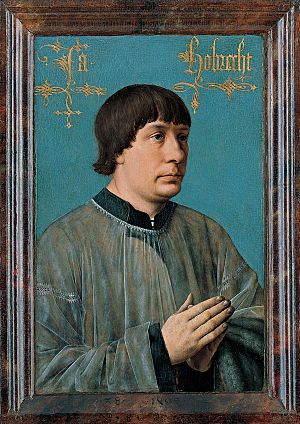Jacob Obrecht facts for kids
Jacob Obrecht (born around 1457 or 1458, died in July 1505) was a famous composer from Flanders. He wrote many masses, motets, and songs. During the late 1400s, he was known as the most important composer of masses in Europe. Only after his death did Josquin des Prez become more famous than him.
Contents
Life of Jacob Obrecht
We don't know much about Obrecht's early life. Most of what we know comes from his motet called Mille quingentis. He was the only child of Willem Obrecht, who was a trumpeter in the city of Ghent, and Lijsbette Gheeraerts. His mother passed away in 1460 when she was only 20 years old. His father died in Ghent in 1488.
Early Education and Career
Obrecht probably learned to play the trumpet, just like his father. This likely taught him about counterpoint (combining different melodies) and how to improvise music. He probably knew Antoine Busnois, another composer, and was definitely familiar with his music. Obrecht's earliest mass sounds a lot like Busnois's style.
Obrecht was a scholar, composer, and clergyman. He often had short jobs in different places. Sometimes, his jobs ended in tricky situations, like when he had to give away choirbooks he had copied to make up for missing money. Even so, people respected him greatly. Johannes Tinctoris, a famous music writer, listed Obrecht as one of the best composers of his time. This was special because Obrecht was only 25 years old then! The famous scholar Erasmus was one of Obrecht's choirboys around 1476.
Travels to Italy and Death
Most of Obrecht's jobs were in Flanders, which is in the Low Countries. However, he traveled to Italy at least twice. The first trip was in 1487. Duke Ercole d'Este I of Ferrara invited him. The Duke had heard Obrecht's music and loved it more than any other composer's work. So, he invited Obrecht to Ferrara for six months.
Obrecht went back to Ferrara in 1504. Sadly, the Duke died early the next year, and Obrecht lost his job. We don't know what he did after that. He died in Ferrara during an outbreak of the plague in July 1505.
Works of Jacob Obrecht
Obrecht mainly wrote sacred music, which means music for church. This included masses and motets. He also wrote some chansons, which are French songs.
Obrecht's Musical Style
Obrecht's music mixed old and new ideas. His masses, more than those of Josquin des Prez, showed a strong connection to the music of Johannes Ockeghem. Obrecht's style is a great example of the complex counterpoint used in the late 1400s.
He often used a technique called cantus firmus for his masses. This meant he took an existing melody and used it as the main part of his new piece. Sometimes, he would break the melody into small parts. Other times, he would play it backward or rearrange the notes. He even sorted the notes by how long they were, from longest to shortest, to create new melodies. Obrecht loved to experiment with music, especially when he was younger.
He also started to move away from strict musical forms, especially in his chansons. The rondeau was a popular form that lasted a long time. However, Obrecht preferred writing masses because they gave him more freedom to create. His motets also showed many different moods and techniques.
Famous Masses
In his Missa Sub tuum presidium, Obrecht made the number of voices increase. The first part, the Kyrie, has three voices. The Gloria has four voices, and so on. The last part, the Agnus Dei, has seven voices! The main melody of the piece is always clear in the top voice. He also included five other special melodies in different parts of the mass.
His later four-voice mass, Missa Maria zart (meaning "tender Maria"), was probably written around 1504. It is based on a popular religious song from the Tyrol region. He likely heard this song when he traveled through that area. This mass takes more than an hour to perform. It is one of the longest musical settings of the Mass Ordinary ever written. Many people consider it one of his best works.
Comparing Obrecht and Ockeghem
Even though Obrecht and Ockeghem worked at the same time, their music was quite different. Obrecht usually used the cantus firmus melody exactly as it was. Ockeghem, however, treated it more freely. In Ockeghem's music, the musical phrases can be hard to tell apart. But in Obrecht's music, you can easily hear where one phrase ends and another begins. Obrecht also often rearranged parts of the cantus firmus melody so you could clearly hear the changes. Ockeghem did this much less often.
Obrecht's Influence
Obrecht's musical methods were very different from the next generation of composers. They preferred a simpler style, which was already hinted at in some works by his friend Josquin des Prez. Even though Obrecht was famous in his time, he didn't seem to influence later composers much. It's likely that his complex style simply went out of fashion as new musical ideas became popular.
See also
 In Spanish: Jacob Obrecht para niños
In Spanish: Jacob Obrecht para niños
 | James Van Der Zee |
 | Alma Thomas |
 | Ellis Wilson |
 | Margaret Taylor-Burroughs |


